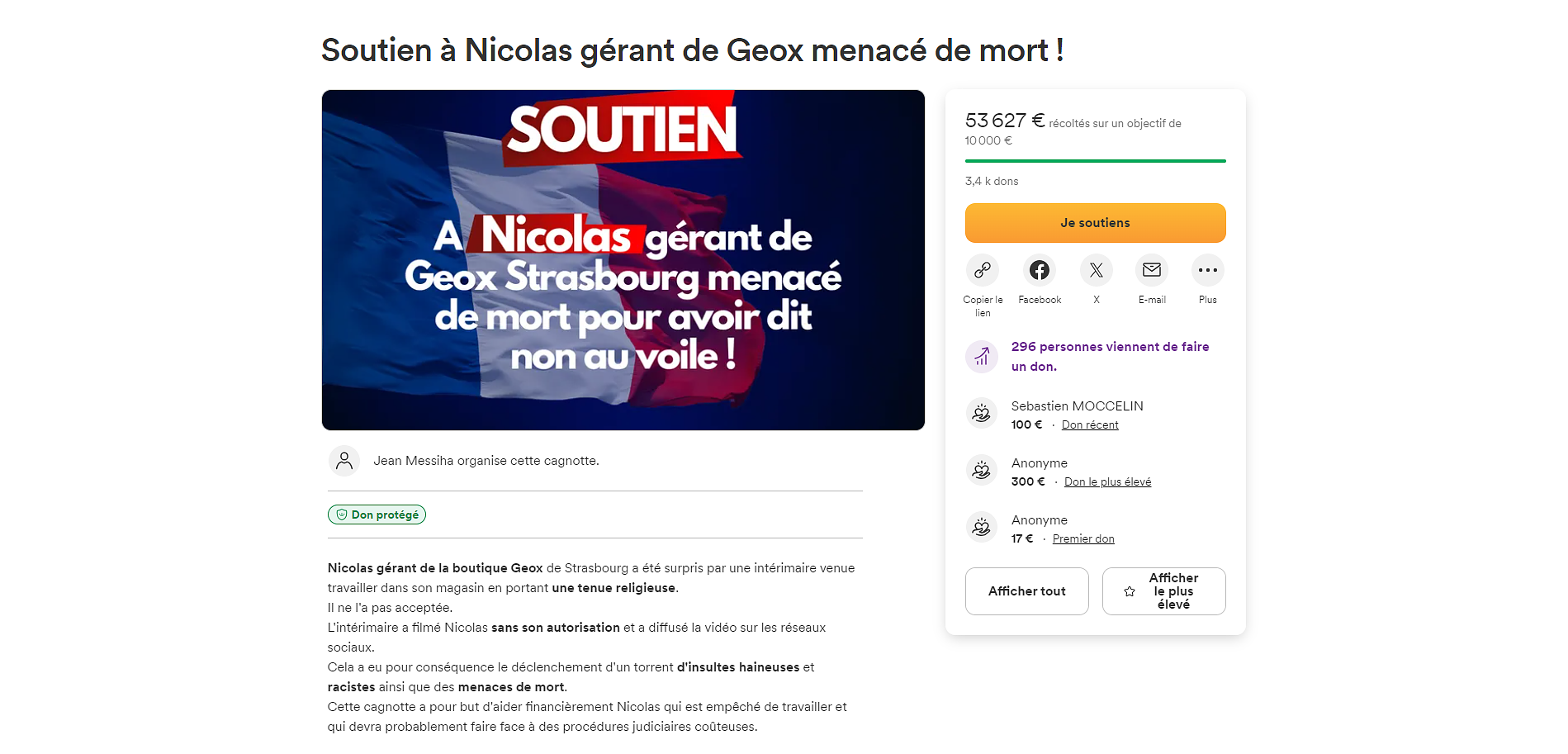the Government's action plan against radicalisation and violent extremism, which was submitted 10. June 2014, gave the Norwegian correctional services the responsibility to develop and test a mentoring scheme aimed at identified inmates who were vulnerable to be recruited to violent extremism.
Columnist Franck Orbanis an associate professor at Østfold university College, research Group AreaS. He is a specialist in French and foreign policy.
Last published posts, So will the Trump-strategist to change the EU from the inside Two France live side by side Macrons monster Macrons first weeks have been "WYSIWYG" The three høyrepopulistene have tailwind in each of their countries, but no real opportunity to take powerthe Project, which has now become a measures in the correctional services, are now evaluated for the first time. The evaluation suggests that the measure has much good to contribute, at the same time as it can be made even better.
Survey taking itself the project's three-year life of the asset in the period 2015-18 and is based on the disclosure in the project documents and dybdeintervjuer with staff who prepared the project and who ran it, fengselsansatte who worked with the inmates who participated in the program, 9 mentors, and 8 "mentorerte".
The first part looks at how the project started and provides the status of how the measure is practiced today. The second part sheds light on the mentorprosjektet from the prisons, the mentors and mentorerte.
Given the project's short life span it chose to have a prosessevaluering rather than a product evaluation. Research internationally is generally very careful not to draw final conclusions about whether or not such measures are able to avradikalisere inmates. To come to such a conclusion, one needs anyway a larger volume - ie. a greater number of inmates as follows measure - and a long-term basis after the first inmates participating in the program, be released.
Other countries such as the united Kingdom and Denmark has built up a better foundation for conducting such evaluations. That this evaluation can tell is how far you have come and what seems to be the experience so far.
It can also say something about the extent to which mentorordningen have been the one foreseen in the beginning, point out any deficiencies and suggest improvements. First, in a few years one will have a better basis for utale more specific about the measure.
Order kriminalomsorgsdirektoratet (KDI) received in July 2014 was as follows: "It shall be developed and are being piloted a mentoring scheme in the Norwegian correctional services. The scheme will primarily be directed towards the identified detainees who are understood to be vulnerable to be recruited to violent extremism, especially young inmates."
Prevention and young prisoners were thus located. It excluded not sentenced and varetektsinnsatte who were charged with or had committed crime related to extremism, could be included in the project.
another dimension was the goal of the project. The prevention of radicalization in prison is all in general about the bl.a. to ensure high quality in the prisoner straffegjennomføringsvilkår. The project's specific mandate gave two options.
The one to give priority to ideological influence, while the other was to give priority to the absence of a return to a criminal life. In this project the influence of the extremist mindset in practice toned down for the benefit of rehabiliteringsarbeidet, at the same time that participation in the project was made voluntary.
Early in the 2015 proposed KDI to anchor mentorordningen as a local action in the east Region and that mentorarbeidet in prison would go out in the municipalities after the atonement, which implies that several agencies would share responsibility with counselors to ensure a cohesive offer for the participants of the project. With the thought of the mentors was to build up a mentorpool, so that one could connect a current candidate for mentorering to the mentor as where and when the passport is best.
the Mentors should have a high degree of theoretical or practical expertise, and should reflect the diversity of society in terms of age, ethnicity, education, working experience and gender. Mentors with a long stay in Norway, which could have the same linguistic, ethnic and cultural background as mentorerte was particularly emphasized. The recruitment of family members or friends, as they have done in other countries, however, was added to the page.
Correctional came under increasing pressure as development in the middle East heated up and the question of how returning jihadists should be handled, came on the agenda.
A more tense security situation at home led that the ministry of Justice and public security went into that mentorordningen would apply to the whole country rather than limited to the Region east. In parallel with the transition to a nationwide solution it chose an organizational structure where one should follow the "line" in the Norwegian correctional services (prison-region-central) and where KDI got control of mentorprosjektet.
Centralization in the KDI made it easier to attend to the concern of security. To return, the scheme more bureaucratic. The transition to a nationwide solution weakened also prosjektaspektet and did it in practice to a new action in the Norwegian correctional services before they had a chance to evaluate the first version.
It happened without the funds to the project increased slightly in particular.
another consequence was that the prevention and young - pga. political priorities and capacity challenges were of less importance in relation to the requirement to handle the returned fremmedkrigere and other islamist prisoners in the Uk who could pose a security threat.
There was less focus on other groups that were also a part of the project, such as right-wing extremist inmates. The combination of these factors influenced the original ambitions for the project.
today mentorordningen not yet mentors in all regions. It is due to the fact that there has not been a need for the former, and budget constraints.
It is also a fact that it is challenging to find, hire and train the mentors in a situation where the recruitment at any time happens by recommendation and contact with the KDIs partners and municipalities.
To return all concerns recorded and processed in anticipation of obtaining a mentor. In June 2018 was recruited 18 mentors, of which 10 from the east region and 3 from the south region, 4 from the region to the southwest and 1 from the region to the north. Against evalueringens end the cooperation with the municipalities to follow up the participants to continue with the same mentor after release.
the Evaluation of the project takes up several issues which can be remedied when it includes the organizational structure, cooperation between mentordningen and "line" in the Norwegian correctional services, selection of participants, evaluation of mentorforløp, as well as the recruitment and training of mentors.
A streamlining of the initiative will be able to ensure that the several prisoners who should be a mentor will receive an offer about it and that they get it faster than before.
Conversations with fengselsansatte, mentors and mentorerte indicate on his page that the targeted confidence-building and awareness-raising seems to help mentorerte to cope with his sentence better, reflect on the past and current options and prepare for a gradual return to the community, without that scheme alone can constitute an absolute guarantee of eventual success for this type of inmates.
Such feedback provides the basis to argue that the scheme has its relevance despite the fact that area.
These must be addressed, at the same time that the measure should strive to find the way back to their original mandate to protect the forebyggingsarbeidet in prison, and emphasizing the work up against young people who may be vulnerable to radicalisation.
such A need will not diminish in the future.

 Rishi Sunak wants a tobacco-free UK
Rishi Sunak wants a tobacco-free UK In Africa, the number of millionaires will boom over the next ten years
In Africa, the number of millionaires will boom over the next ten years Iran's attack on Israel: these false, misleading images spreading on social networks
Iran's attack on Israel: these false, misleading images spreading on social networks Iran-Israel: David Cameron wants the G7 to impose “coordinated sanctions” on Iran
Iran-Israel: David Cameron wants the G7 to impose “coordinated sanctions” on Iran New generation mosquito nets prove much more effective against malaria
New generation mosquito nets prove much more effective against malaria Covid-19: everything you need to know about the new vaccination campaign which is starting
Covid-19: everything you need to know about the new vaccination campaign which is starting The best laptops of the moment boast artificial intelligence
The best laptops of the moment boast artificial intelligence Amazon invests 700 million in robotizing its warehouses in Europe
Amazon invests 700 million in robotizing its warehouses in Europe Solar panels: French manufacturer Systovi announces the cessation of its activities due to “Chinese dumping”
Solar panels: French manufacturer Systovi announces the cessation of its activities due to “Chinese dumping” Tesla: canceled in court, Musk's huge compensation plan will again be submitted to shareholders
Tesla: canceled in court, Musk's huge compensation plan will again be submitted to shareholders Two, three or a hundred euros: who are the most generous customers with tips?
Two, three or a hundred euros: who are the most generous customers with tips? Boeing safety examined in US Senate, after whistleblower's revelations
Boeing safety examined in US Senate, after whistleblower's revelations Immersion among the companions of the Liberation
Immersion among the companions of the Liberation Provence-Alpes-Côte d’Azur releases several hundred thousand euros for the promotion of the work of Marcel Pagnol
Provence-Alpes-Côte d’Azur releases several hundred thousand euros for the promotion of the work of Marcel Pagnol A palm of honor distinguishes Studios Ghibli for all of their work
A palm of honor distinguishes Studios Ghibli for all of their work Gaby, a new play by Pagnol adapted into a comic strip
Gaby, a new play by Pagnol adapted into a comic strip Skoda Kodiaq 2024: a 'beast' plug-in hybrid SUV
Skoda Kodiaq 2024: a 'beast' plug-in hybrid SUV Tesla launches a new Model Y with 600 km of autonomy at a "more accessible price"
Tesla launches a new Model Y with 600 km of autonomy at a "more accessible price" The 10 best-selling cars in March 2024 in Spain: sales fall due to Easter
The 10 best-selling cars in March 2024 in Spain: sales fall due to Easter A private jet company buys more than 100 flying cars
A private jet company buys more than 100 flying cars This is how housing prices have changed in Spain in the last decade
This is how housing prices have changed in Spain in the last decade The home mortgage firm drops 10% in January and interest soars to 3.46%
The home mortgage firm drops 10% in January and interest soars to 3.46% The jewel of the Rocío de Nagüeles urbanization: a dream villa in Marbella
The jewel of the Rocío de Nagüeles urbanization: a dream villa in Marbella Rental prices grow by 7.3% in February: where does it go up and where does it go down?
Rental prices grow by 7.3% in February: where does it go up and where does it go down? Europeans: the schedule of debates to follow between now and June 9
Europeans: the schedule of debates to follow between now and June 9 Europeans: “In France, there is a left and there is a right,” assures Bellamy
Europeans: “In France, there is a left and there is a right,” assures Bellamy During the night of the economy, the right points out the budgetary flaws of the macronie
During the night of the economy, the right points out the budgetary flaws of the macronie Europeans: Glucksmann denounces “Emmanuel Macron’s failure” in the face of Bardella’s success
Europeans: Glucksmann denounces “Emmanuel Macron’s failure” in the face of Bardella’s success These French cities that will boycott the World Cup in Qatar
These French cities that will boycott the World Cup in Qatar Union Bordeaux Bègles-Clermont: at what time and on which channel to follow the Top 14 clash?
Union Bordeaux Bègles-Clermont: at what time and on which channel to follow the Top 14 clash? Football: Ada Hegerberg extends at OL until 2027
Football: Ada Hegerberg extends at OL until 2027 Basketball: suspended for life from NBA for fixing his match
Basketball: suspended for life from NBA for fixing his match Paris 2024 Olympic Games: boxer Estelle Mossely wants to parade on the Seine as a flag bearer
Paris 2024 Olympic Games: boxer Estelle Mossely wants to parade on the Seine as a flag bearer


















